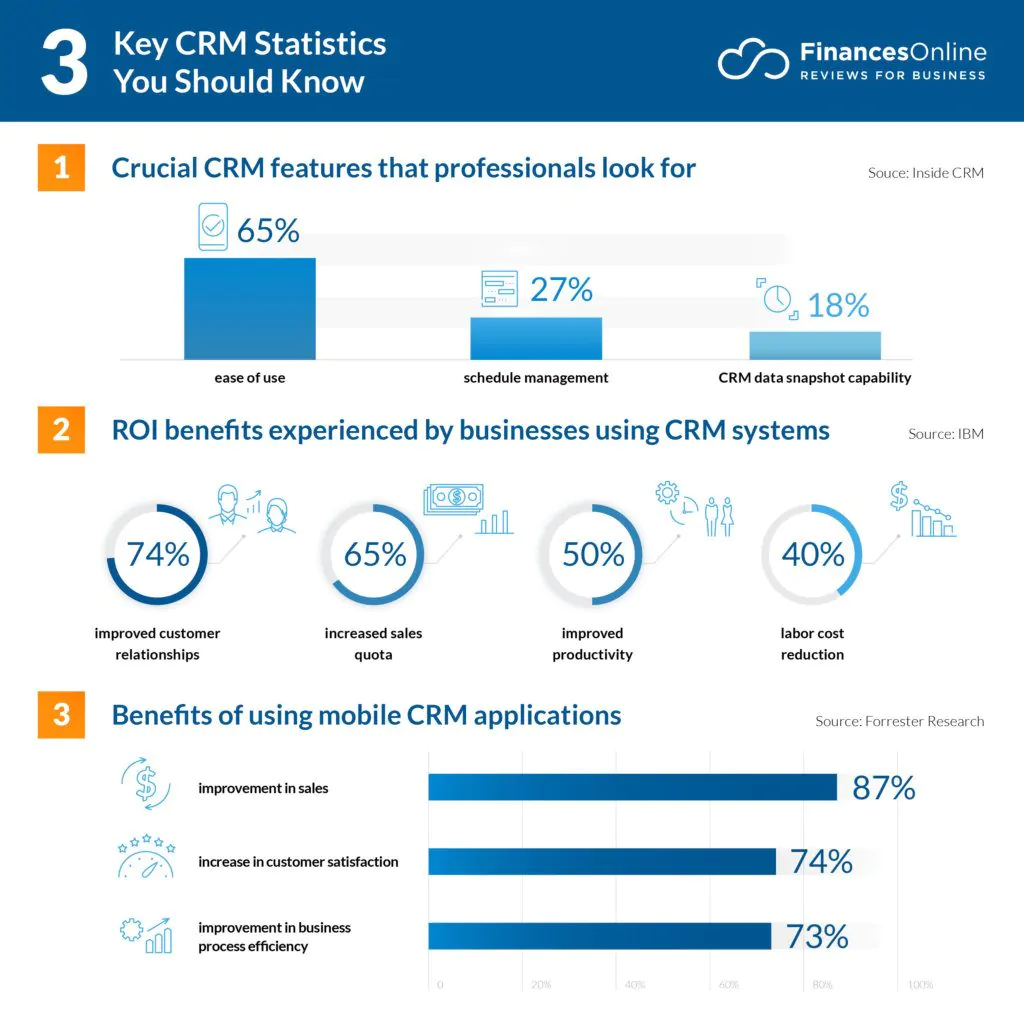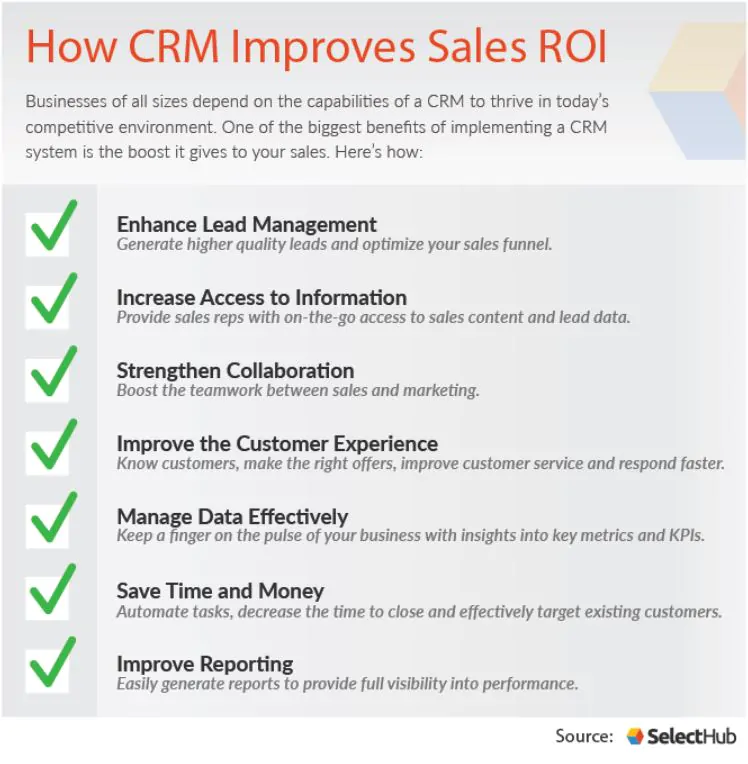Customer relationship management, commonly referred to as CRM, has become a buzzword in the last decade. An estimated 91% of organizations with more than ten employees now rely on CRM systems, and analysts predict the industry will be worth $96.5 billion by 2028. But how can sales CRM tools work to improve business revenue?
This comprehensive article examines how a CRM tool works to improve customer experience, retention, employee productivity, data reporting, and more. If you’re ready to boost your return on investment (ROI), keep reading to learn the benefits of CRM.
Key Takeaways:
- An all-in-one CRM tool streamlines business processes, automates tasks, and collects data on the buyer lifecycle. Teams can use this information for cross-collaboration and high-level strategizing.
- Companies use CRM software to identify and nurture leads, manage existing customer relationships, and improve retention.
- A sales CRM tool also automates tasks to increase employee productivity and reduce the cost of sales.
- Analytics and reports from CRM data provide valuable insights into overall business performance and opportunities for improvement.
Source: Finances Online
How Does CRM Work?
An all-in-one CRM software provides business intelligence and data for sales, marketing, customer service, and automation processes in one convenient place.
Sales CRM tools focus on identifying prospects and understanding the customer’s lifecycle. The goal of CRM is to streamline processes and simplify how information about customers is collected, stored, and displayed so a business can use the data to increase productivity.
7 Ways Sales CRM Tools Can Increase Revenue
When used correctly, CRM systems drastically improve your company’s productivity and effectiveness, leading to a boost in revenue and ROI. Here are some of the ways CRM improves your business:
1. Prioritize Marketing Qualified Leads (MQLs)
A marketing qualified lead has demonstrated an interest in a brand and is more likely to make a purchase than a typical lead.
Sales CRM tools provide businesses with the resources to generate new leads and prioritize the most promising MQLs. Multiple departments within the company have access to data that will help them customize a buyer’s experience depending on what stage of the sales funnel they’re in.
2. Manage Customer Relationships
One of the most significant advantages of a CRM system is its opportunity to proactively manage customer relationships. Customer data analytics reveal a deeper understanding of how consumers perceive and interact with your brand.
A CRM sales tool can help a business to improve:
- Timing: Analyze real-time customer activity so your team knows when to send marketing, educational, or follow-up content at the most opportune time.
- Engagement: Understand how your customers engage with your brand so you can create more content and tailored recommendations.
- Improvement: Identify reoccurring pain points for customers to improve their overall experience.
- Scale for growth: Provide the customized, small-business experience your customers love even as your brand grows into a big business.
3. Increase Automation and Productivity
Sales CRM tools automate tedious manual tasks. Instead of searching for contact information, entering data, or hunting for previous customer service emails, your team has more time to engage directly with customers.
Automating repetitive tasks frees up valuable time. With CRM tools, menial time-consuming tasks no longer pull attention away from engaging with prospective leads and nurturing connections with existing customers. Higher productivity means happier consumers and increased revenue.
4. Reduce the Cost of Sales
A CRM tool provides valuable insights that will help your team reduce the cost of sales. The CRM system achieves this by helping teams:
- Prioritize leads that are highly likely to convert
- Identify upsell and cross-sell opportunities to increase average order value
- Pinpoint and improve customer touchpoints
All of these opportunities save your business time and money to close the sale for new and existing customers alike.
5. Improve Customer Experience and Retention
Ninety-five percent of consumers say that customer care is vital to earning a client’s loyalty. Eighty-nine percent of people switched to another brand following just one poor customer service-related experience.
CRM tools help businesses deliver consistent customer experience across departments by providing access to a buyer’s complete history, previous interactions, sales, website visits, social media activity with the brand, and more. This information helps teams personalize messaging and ensure smooth interactions and solutions.
Automation is also improving customer service and lead nurturing. CRM chatbots have become sophisticated enough to provide customers with basic information such as tracking packages, thereby freeing live agents to focus on more personalized issues that need attention. Chatbots also ask questions, collect data, deliver personalized content, and guide leads through marketing and sales pipelines.
High-quality customer service translates to loyal clients, positive product reviews, word-of-mouth recommendations, increased order volume, and a long list of other benefits.
6. Strengthen Collaboration Between Sales and Marketing
Marketing and sales must work in tandem to provide a unified, positive experience and convert prospects to customers. A sales CRM tool not only makes data accessible across departments but also organizes it with customizable dashboards designed to best suit each team’s needs.
CRM fosters cross-functional collaboration within the company and even with third-party vendors and partners. Sales, marketing, customer service, IT, and other departments can seamlessly work together and share information.
7. Improve Analytics, Reporting, and Data Management
The sales intelligence data collected with a CRM tool is vital to implementing high-level strategies. This organized data reveals overall business performance from the customer’s journey to the success or failure of marketing campaigns.
It also provides visibility into opportunities for improvement. CRM data might reveal issues in the sales funnel where prospects repeatedly lose interest and abandon carts.
This data can be organized and presented in visual graphics to help the team make marketing decisions and plan new campaigns.
Source: SelectHub
Upgrade Your Business with the Right Sales CRM Tool
A CRM system can yield an average of 45% ROI for every dollar invested when implemented correctly. But not every CRM tool is optimized to fit your business’s exact needs.
MXTR helps you find the right solution tailored to your marketing goals, customer journey, and business strategies. We work closely with your team to connect consumer touchpoints and build relationships as you nurture leads.
Are you ready to invest in a sales CRM tool? Schedule a demo to see how our team can improve your business’s productivity, leads, and retention.
Featured Image: istockphoto







